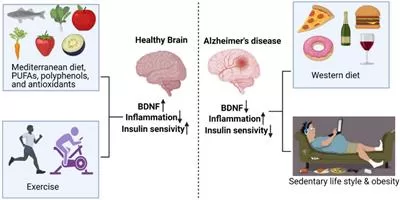
A recent study conducted by the Centro Nacional de Investigaciones Cardiovasculares (CNIC) in Madrid has shed light on the complex relationship between cardiovascular disease and dementia, emphasizing the critical role of managing traditional cardiovascular risk factors. The research, published in The Lancet Healthy Longevity, reveals that these risk factors, such as hypertension, cholesterol, diabetes, smoking, and a sedentary lifestyle, not only impact cardiovascular health but also play a significant role in the development of Alzheimer’s disease and other forms of dementia.
Dr. Valentin Fuster, the General Director of CNIC and a study author, underscores the significance of these findings, suggesting that addressing cardiovascular disease, a modifiable condition, may help prevent dementia, for which there is currently no curative treatment. He emphasizes the importance of early intervention in controlling cardiovascular risk factors for better brain health.
The study builds on previous research conducted in 2021 by CNIC scientists, which demonstrated a link between cardiovascular risk factors, subclinical atherosclerosis in the carotid arteries (arteries supplying the brain), and lower glucose metabolism in the brains of healthy 50-year-old individuals. Reduced glucose metabolism in the brain is considered an indicator of compromised brain health.
The ongoing PESA-CNIC-Santander study, directed by Dr. Fuster, monitored the cerebral health of more than 4,000 asymptomatic middle-aged participants since 2010. The research showed that individuals with sustained high cardiovascular risk experienced a more significant decline in cerebral glucose metabolism over five years, as detected through imaging techniques like positron emission tomography (PET). This sustained decline in cerebral glucose consumption may limit the brain’s ability to withstand future neurodegenerative or cerebrovascular diseases.
Additionally, the study collaborated with experts in identifying new blood biomarkers, Drs. Henrik Zetterberg and Kaj Blennow at the University of Gothenburg in Sweden, to discover that individuals with metabolic decline in the brain also displayed signs of neuronal injury. Neuronal death is typically irreversible, highlighting the importance of early intervention.
Furthermore, the progression of subclinical atherosclerosis in the carotid arteries over five years was linked to a metabolic decline in brain regions vulnerable to Alzheimer’s disease, in addition to the influence of cardiovascular risk factors. This suggests that carotid screening could be instrumental in identifying individuals at risk of cognitive decline.
In conclusion, the study suggests that carotid screening may be a valuable tool for identifying individuals at risk of cerebral alterations and cognitive decline in the future. The findings support the implementation of primary cardiovascular prevention strategies from an early age to promote healthy cognitive longevity. While the precise impact of cerebral metabolic decline on cognitive function remains to be determined, the research underscores the importance of early intervention in managing cardiovascular risk factors for the well-being of the brain.











